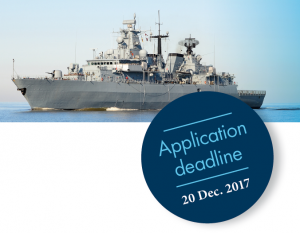
The Use of Force at Sea
Spring School & Conference Turin Italy
Monday 16 April 2018 – Friday 20 April 2018
Human Rights at Sea is pleased to highlight the forthcoming Peace and Security at Sea (PaSS) Spring school event feature in-depth discussion including on the issue of human rights at sea.
The use of force is a core issue of international law. The Spring School on Peace and Security brings to the forefront the issue of use of force at sea specifically. The broad approach taken considers the use of force by individuals and States, and as part of law enforcement operations and conduct of hostilities.
It is necessary to discuss the use of force at sea specifically for two reasons. First, the bulk of legal instruments and related writings pertain to the use of force at land; hence, it must be assessed from a legal and operational perspective whether and how they apply in the maritime context. Second, a series of factual and operational developments – new scenarios, new actors and new at-sea technologies – necessitate an analysis of the use of force in the context of the maritime environment.
In terms of ‘scenarios’, situations are multiplying where it is unclear whether force is used within the framework of law enforcement operations or rather as part of conduct of hostilities (e. g. when coastguards and other civilian-manned vessels in various parts of the world’s oceans carry out military rather than constabulary functions). As a consequence, it is ambiguous whether a law enforcement paradigm reigns or the more permissive law of armed conflicts is the defining approach to the use of force.
In terms of ‘actors’, the increased use of and reliance on private actors to prevent criminal offences at sea (e. g. to protect offshore installations or to prevent piracy attacks) and even to enforce the law (e. g. fisheries laws) can be witnessed; this necessitates an assessment of their respective powers.
Finally, ‘at-sea technologies’ remove the need for a direct encounter or physical presence in the display of force. Such technology is being used not only to respond to maritime security threats (e.g. the use of unmanned autonomous maritime systems) but also as a means of creating such threats in the first place (e. g. cyberattacks).
Anna Petrig, Co-Director of the Spring School said: “The use of force is a core issue of international law. The legal and operational context at sea differs from land. That’s why it is important to consider the use of force from a maritime perspective specifically. The Spring School on the Use of Force at Sea brings together practitioners, academics and students to engage in such topical discussion. Needless to say that the Spring School devotes time to the impact the use of force has on human rights at sea.”
DOWNLOAD THE PROGRAMME

The Spring School is funded by the University of Basel and by the Institute for International Legal Studies of CNR. There is no participation fee. However, participants are responsible for their travel and accommodation costs.
